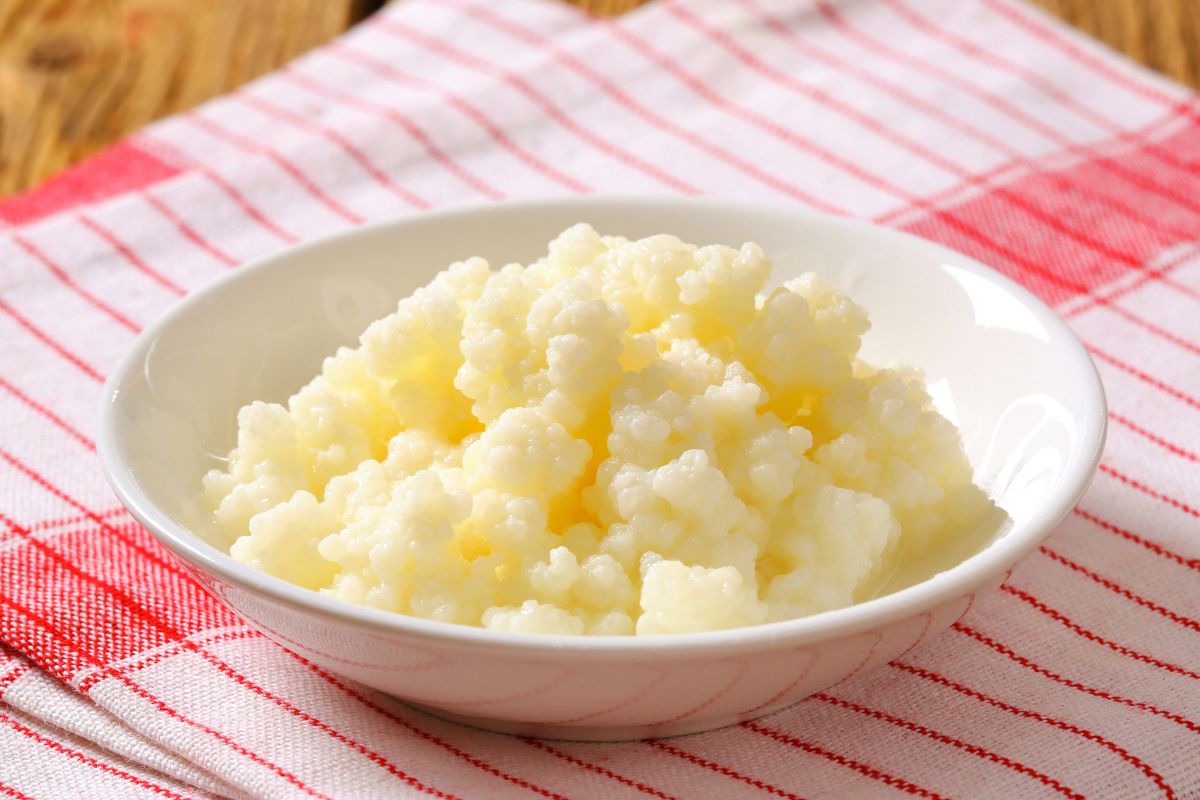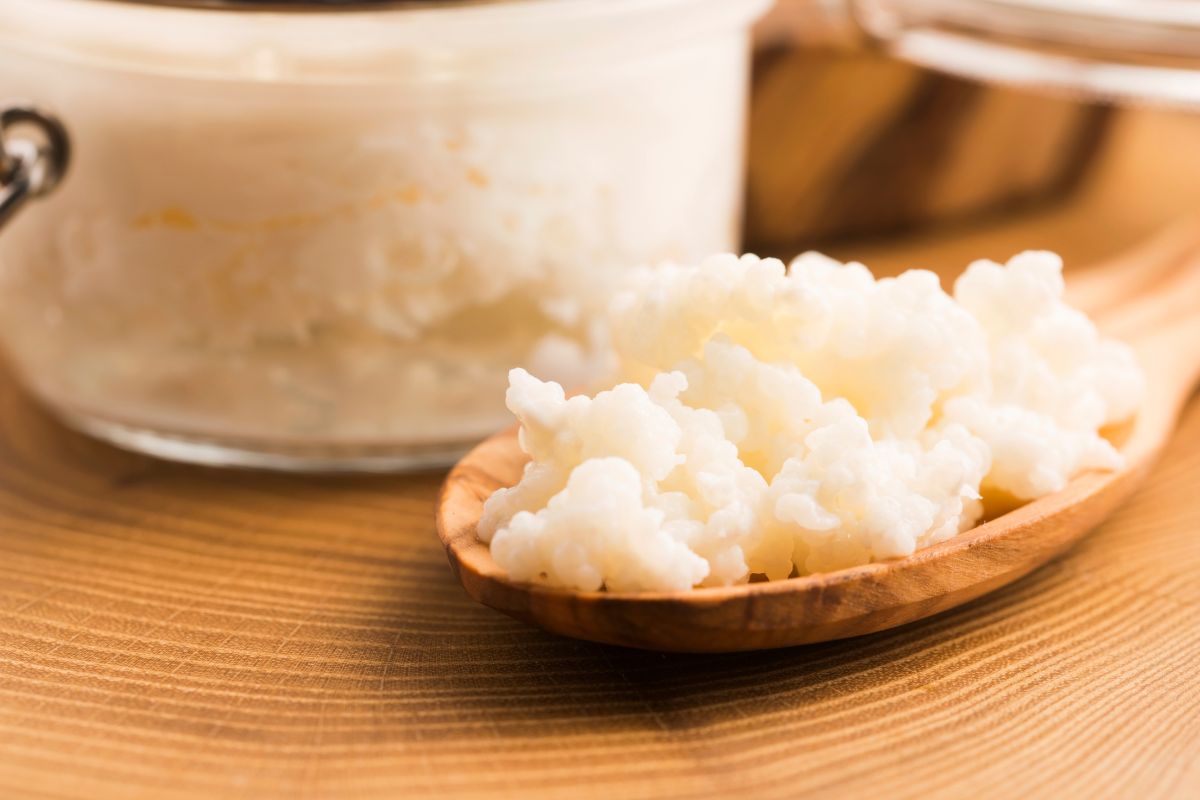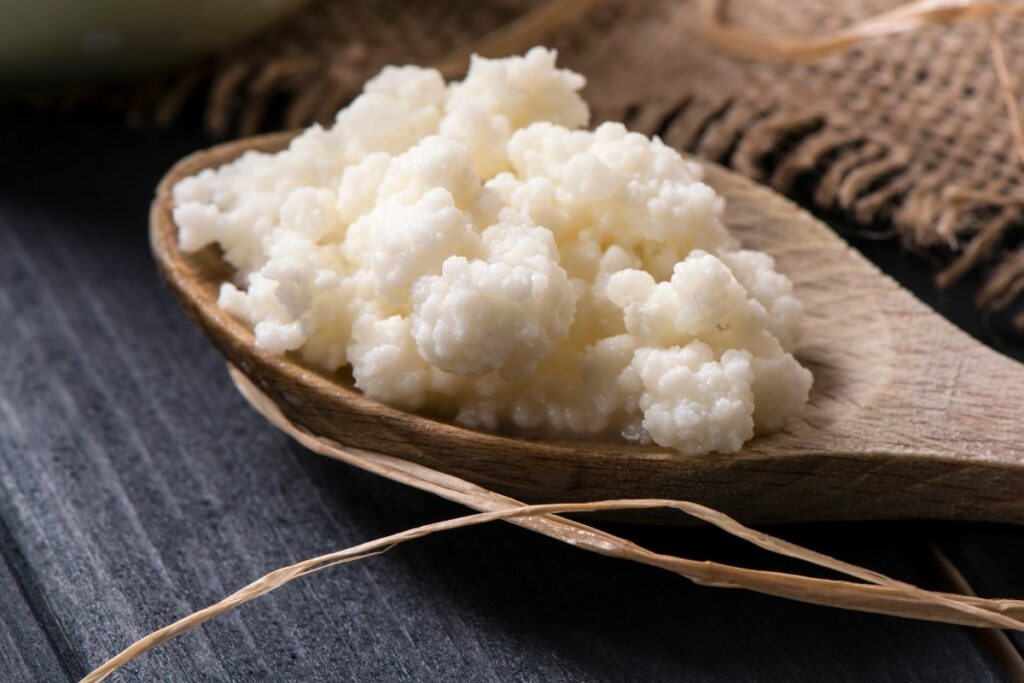Fun fact: kefir got its name from the Turkish word “keyif”, which means to “feel good”.
So it’s no wonder kefir grains are rising in popularity – both as a “new” superfood and health-boosting beverage.
In fact, many health enthusiasts are putting kombucha and Greek yogurt aside and turning to kefir instead thanks to the wealth of additional benefits it brings to the table.
But what are those benefits, you ask?
You’ve arrived at the right place, as below we run through 10 proven benefits of kefir grains (and drinking kefir!).
What Are Kefir Grains?
Kefir grains are not your typical grains, like wheat or oats. First, they’re gelatinous and sticky. Second, they’re made of living yeast and bacteria.
The fact that kefir grains look like cauliflower clusters is another reason that makes them unique from other grains.
Despite being considered “new” on the scene, kefir grains have actually been around for thousands of years.
They originated in the North Caucasus in Russia and were consumed widely as an oatmeal-like dish before spreading to other parts of the world.
Now, the most popular use of kefir grains is making kefir.
The living microorganisms in kefir grains ferment and activate when left in milk or water, making a creamy, tangy beverage (think Yakult, but thicker) that’s packed full with nutritious probiotic content.
10 Proven Health Benefits Of Kefir Grains

No matter whether you plan on eating kefir grains or making kefir, there’s no doubt that kefir grains have numerous proven health benefits.
To satisfy your curiosity, we’ve listed 10 proven health benefits of kefir grains below.
1. Kefir Grains Are Low In Calories, Carbohydrates, And Fat
Kefir grains are low in calories, low in carbohydrates, and low in fat. So if you’re on a weight loss diet, this will come as good news.
What’s more, kefir grains are also widely accepted as keto-friendly among keto diet followers.
One cup of kefir made with low-fat milk can contain as low as 110 calories, 12 grams of carbohydrates, 2 grams of fat, and 11 grams of protein.
For a single beverage that you can drink in one sitting, that’s far healthier than most store-bought beverages.
Of course, making kefir with full-fat milk and sugar will reduce its healthiness, but, on its own, kefir and kefir grains are great for those who watch their health and weight.
2. Kefir Grains Are High In Protein
Above we mentioned that one cup of kefir made with low-fat milk contains up to 11 grams of protein.
So on top of being low in calories, carbs, and fat, kefir is a fantastic, and convenient, source of protein.
Protein is an important compound that improves muscle health and muscle growth, and it’s no secret that it’s also an essential part of any well-balanced diet.
So for people who don’t get enough protein in their diet or want to increase their daily protein intake quickly and easily, kefir grains can be a great food source to turn to.
In addition, protein is also well-known to be more filling than carb-heavy foods, which can help reduce overeating.
3. Kefir Grains Are A Great Source Of Health-Boosting Nutrients
Kefir grains have a lot more going for them than being high in protein, low in carbohydrates, low in fat, and low in calories. They’re also a great source of health-boosting vitamins and minerals.
These nutrients include calcium, magnesium, vitamin B12, riboflavin (vitamin B2), vitamin D, and phosphorus.
Calcium is essential for bone health while magnesium supports various functions of the muscles, nerves, brain, and more.
As for the vitamins in kefir grains, vitamin B12 is important for red blood cell formation, vitamin B2 reduces inflammation, and vitamin D supports bone health and improves mood.
Phosphorus, another important nutrient in kefir grains, aids muscle growth and cell repair through the production of ATP.
4. Kefir Grains Improve Digestion And Gut Health
Since kefir grains are made up of live lactic acid bacteria and yeast, consuming them regularly will improve digestion and gut health.
In fact, kefir contains up to 60 different types of bacteria and yeast, as well as millions of probiotics – essentially good bacteria that your body needs to fight off bad bacteria and function optimally.
One of these is lactobacillus, which is one of the main ingredients in Yakult.
Alongside improving food digestion and gut health, probiotics can also prevent diarrhea and other stomach-related issues, support natural vitamin production in the body, and boost immune health.
5. Kefir Grains Have Antibacterial Properties
As a source of healthy bacteria, kefir grains can help to fight off and prevent bacterial infections in the body.
This can include urinary tract infections, sinus and ear infections, salmonella, gastroenteritis, and more.
The antibacterial properties of kefir grains is strongly linked to its high probiotic content, which includes lactobacillus – a bacteria that aids and supports healthy digestion and gut health.
As a result, consuming kefir grains regularly can be a way to boost the immune system and prevent infections, viruses, allergies, and other common illnesses.

6. Kefir Grains Have Anti-Inflammatory Properties
Inflammation occurs when the immune system detects a bacterial irritant, after which the body starts the healing process.
And in addition to having antibacterial properties, another health benefit of consuming kefir grains is that the probiotics it contains also offers many anti-inflammatory properties.
These anti-inflammatory properties can suppress various kinds of inflammation, including the body’s reaction to allergies, as well as speed up the healing process of wounds.
This is especially important since prolonged inflammation can lead to different health issues and diseases, such as diabetes and cancer.
7. Kefir Grains Have Anti-Cancerous Properties
Bioactive compounds that include the proteins and carbohydrates (polysaccharides) found in kefir grains have immune system-boosting benefits that can help to prevent cancer cells from activating.
These compounds can disrupt the cycle of cancer cells and stop cancer cells from growing.
This is also due to the probiotics in kefir, which can help to fight off mutagens and carcinogens, as well as help to prevent and slow down tumor growth in the body.
The anti-inflammatory properties found in kefir grains are another reason it can help to prevent cancer, as prolonged inflammation is linked to various common diseases and chronic illnesses.
8. Kefir Grains Improve Bone Health
Bones are living, growing tissues that protect organs and support everyday movements, predominantly made of calcium and collagen.
And since kefir grains are a great source of calcium (and other essential minerals and vitamins), consuming kefir grains frequently can improve bone health, increase bone density, and support everyday movement as a direct result.
This includes improving joint health in general and decreasing the risk of joint-related issues, like arthritis.
Kefir grains can also prevent bone conditions such as osteoporosis, which causes bone tissue to deteriorate in old age.
9. Kefir Grains Improve Organ Health
Kefir grains can improve organ health, which includes the heath and basic functions of the heart, liver, and kidneys (see more about the effects of kefir on kidneys by clicking here).
This is due to the probiotic microorganisms in kefir grains that can help flush out and reduce the build-up of unhealthy fats in and around the arteries and vital organs, which can lower cholesterol and reduce blood pressure.
Kefir grains can help reduce and prevent fatty liver syndrome, as well as improve lipid metabolism, which helps the heart to function.
In the kidneys, the probiotics in kefir can also break down unwanted waste such as uric acid and creatinine, helping the kidneys to function optimally.
These benefits are the reasons why kefir has become a popular drink among health enthusiasts, as well as fitness enthusiasts who perform cardiovascular exercise on a regular basis.
10. Kefir Grains Are Low In Lactose
Last but not least, kefir grains are also low in lactose – a natural sugar that’s hard to digest and break down for people who are lactose intolerant.
Due to this, non-dairy kefir beverages made from kefir grains can be a great substitute for many dairy foods and drinks, helping to prevent negative symptoms of lactose intolerance.
Some of these symptoms include stomach cramps, diarrhea, bloating, excessive gas, nausea, vomiting, and more.
Since kefir can be made with water, coconut water, and non-dairy milks made from almonds, soy, or oats, it’s also a versatile option for lactose intolerant individuals who have problems digesting common dairy products, such milk, cheese, cream, and yogurt products.
The fact that kefir is also a good source of healthy vitamins and minerals is another reason it has become a popular beverage among those who are lactose intolerant.
Final Thoughts
Needless to say, kefir grains bring a lot of health-boosting benefits to the table – no matter whether you choose to eat it as it is or use the grains to create kefir.
Milk kefir and water kefir have become popular probiotic drinks for the above reasons, and it’s also super easy to make at home.
To conclude, just some of the many benefits of kefir grains include its high probiotic content, rich source of essential vitamins and minerals, and its many antibacterial and anti-inflammatory properties that can support the immune system and prevent various illnesses and diseases.








